
Switzerland wants to move away from the "disposable cow"
She could look like Brenda, one of the twenty cows grazing in the meadow above Untersee. Brenda doesn't give as much milk as Paloma next to her, who is expected to produce a hundred thousand litres in her short life; she is ten centimetres smaller and has more meat on her bones. Instead, she makes do with the feed she finds on the pasture, hardly needs a vet with her healthy udder and promises five to six calves, i.e. lactation periods, instead of just three to four like a high-yielding cow. Source: www.nzz.ch
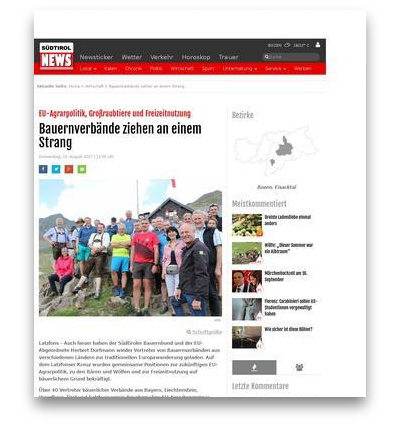
Farmers' organisations pull together
Latzfons - Once again this year, the South Tyrolean Farmers' Association and MEP Herbert Dorfmann invited representatives of farmers' organisations from various countries to the traditional European hike. At the Latzfons Cross, common positions on future EU agricultural policy, bears and wolves and the recreational use of farmland were reaffirmed. Source: www.suedtirolnews.it
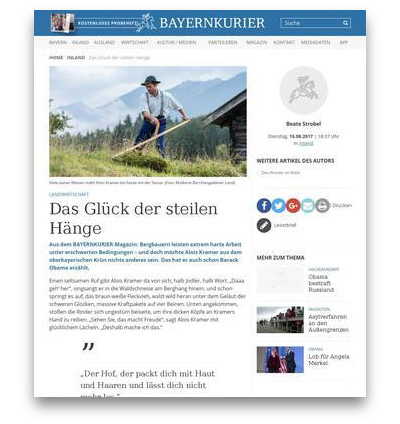
The happiness of steep slopes
From the BAYERNKURIER magazine: Mountain farmers work extremely hard under difficult conditions - and yet Alois Kramer from Krün in Upper Bavaria wouldn't want to be anything else. He has already told Barack Obama this. source: www.bayernkurier.de
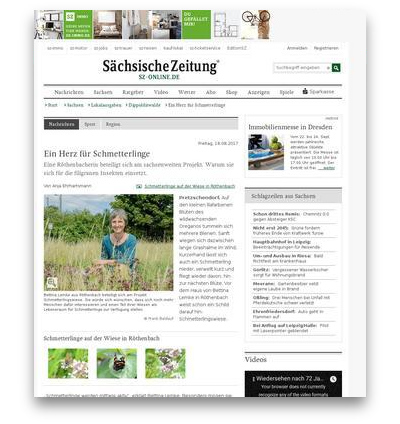
A heart for butterflies
A woman from Röthenbach is taking part in the Saxony-wide project. Why she is committed to the delicate insects Source: www.sz-online.de
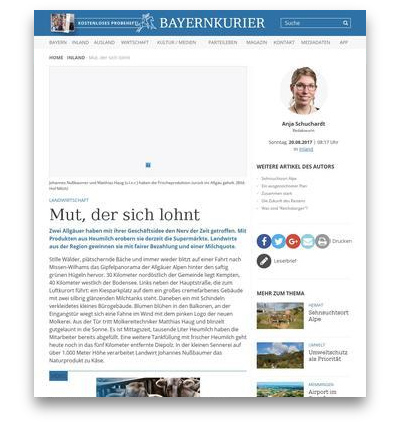
Courage that pays off
Two people from the Allgäu region have hit the nerve of the times with their business idea. They are currently conquering supermarkets with products made from hay milk. They are winning over farmers from the region with fair payment and a milk quota. source: www.bayernkurier.de
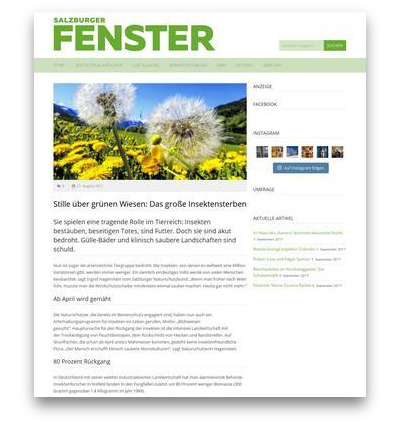
Silence over green meadows: The great insect extinction
They play a key role in the animal kingdom: insects pollinate, remove dead matter and provide food. But they are under acute threat. Slurry baths and clinically clean landscapes are to blame. source: www.salzburger-fenster.at
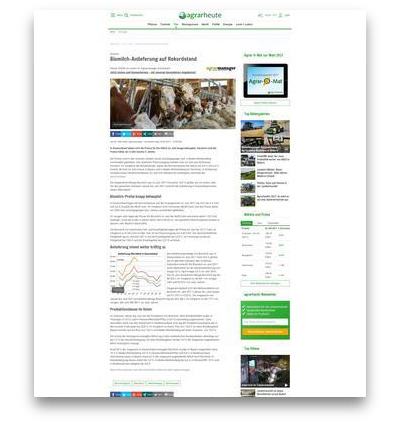
Organic milk deliveries at record level
Prices fell slightly in most federal states and remained unchanged in Baden-Württemberg. The sharpest fall in prices was reported in Schleswig-Holstein in June. In a comparison of the federal states, organic milk prices (for milk with 4.0% and 3.4% protein, ex-farm) were again highest in Bavaria and Baden-Württemberg in June. In Schleswig-Holstein, organic milk prices were by far the lowest in June, reports agrarmanager. source: www.agrarheute.com
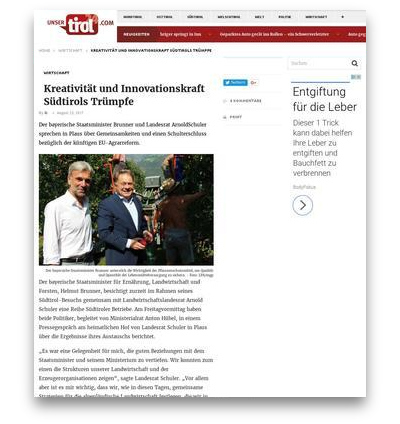
South Tyrol's trump cards: creativity and innovation
Bavarian State Minister Brunner and State Councillor Arnold-Schuler talk in Plaus about common ground and closing ranks on future EU agricultural reform Source: www.unsertirol24.com
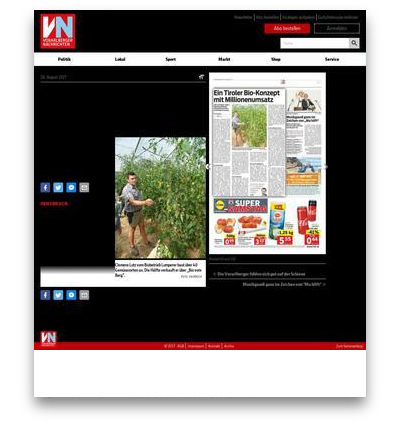
A Tyrolean organic concept with millions in sales
"Bio vom Berg" shows it: Regional organic farming can become an economic factor. World champion cheese! The "Bio-Gold" is the pride and joy of the Kolsass dairy in Tyrol. The medals are clearly visible in the dairy's own small shop. Right at the counter. The company specialises in soft cheese as a niche product, exclusively organic, regional and handmade, which is why the staff Source: www.vn.at
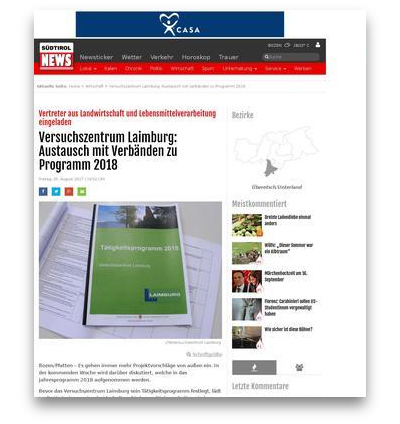
Laimburg Research Centre: Exchange with associations on the 2018 programme
Bolzano/Pfatten - More and more project proposals are coming in from outside. In the coming week, a discussion will take place to decide which ones will be included in the 2018 annual programme. source: www.suedtirolnews.it
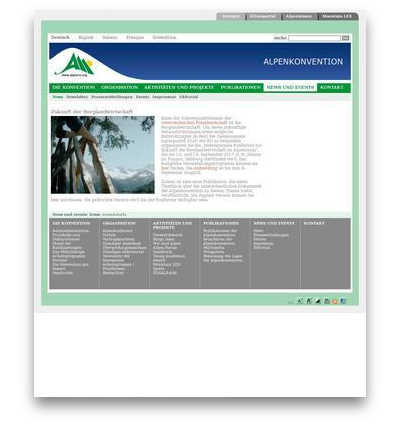
The future of mountain farming
One of the key topics of the Austrian Presidency is mountain farming. In order to address its future challenges and possible developments in the field of the EU's Common Agricultural Policy 2020, they are organising the "International Conference on the Future of Mountain Farming in the Alpine Region", which will take place on 13 and 14 September 2017 in St. Johann im Pongau, Salzburg. You can find the complete event programme here. Registration is open until 8 September. source: www.alpconv.org
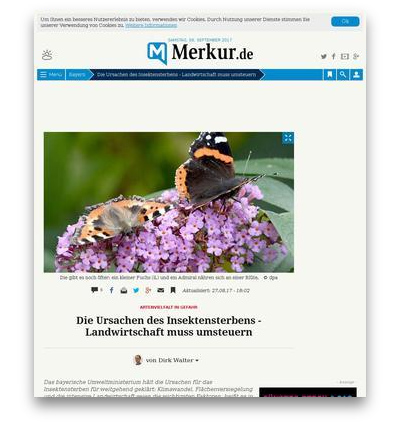
The causes of insect mortality - agriculture must change course
The Bavarian Ministry of the Environment considers the causes of insect mortality to be largely clear: climate change, land sealing and intensive agriculture are the most important factors, according to an answer to a question from the SPD. Source: www.merkur.de

